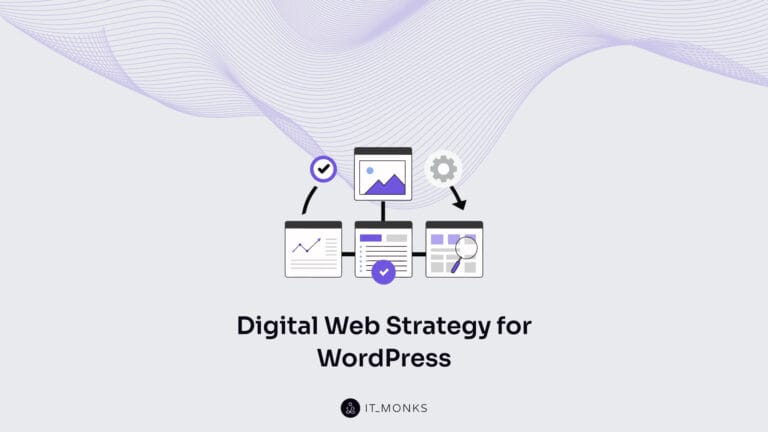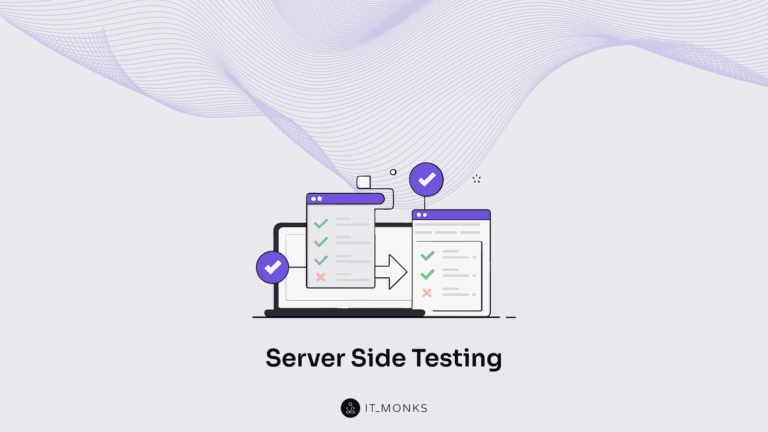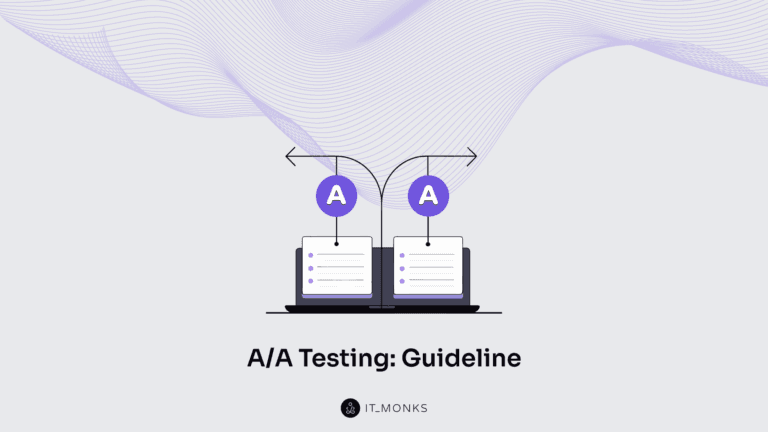WordPress Trends in 2024
Table of Contents

In 2024, the field of web development continues its dynamic evolution, with WordPress standing as a central force shaping the digital landscape. As the most widely used content management system (CMS), WordPress plays a pivotal role in driving innovation and setting the stage for online experiences. Staying attuned to the latest trends is not merely a choice but a necessity for those navigating the competitive realm of web development. In 2024, the most popular WordPress trends include optimized performance enhancements, AI integration for advanced user experiences, and the revolutionary Full Site Editing (FSE) feature, providing a holistic approach to site customization.
Additionally, WordPress’s commitment to robust security, advancements in WooCommerce for seamless e-commerce, and the adoption of sustainable practices in web design underscore the platform’s ongoing influence. The integration of intuitive drag-and-drop builders, the embrace of dark mode for enhanced user experiences, and WordPress’s role as a powerhouse for Software as a Service (SaaS) companies further define the dynamic trends driving innovation in 2024.
What is WordPress Development?
WordPress development involves creating and customizing websites and web applications using the WordPress content management system (CMS). WordPress is a highly versatile and widely used platform, WordPress enables developers to build websites for various purposes, from blogs and personal portfolios to e-commerce sites and corporate web pages. Tasks within WordPress development encompass:
- Coding custom themes and plugins
- Optimizing for performance and security
- Ensuring a seamless user experience, etc.
Developers may also work on enhancing the functionality of existing WordPress sites, troubleshooting issues, and keeping the platform and its components up to date. WordPress development empowers businesses and individuals to establish an online presence tailored to their needs and objectives.
1. Optimized Performance and Speed Enhancements

In the fast-paced digital realm of 2024, website speed and performance have become paramount. A swift and responsive website is crucial for user satisfaction and significantly impacts search engine rankings and overall business success. Key factors influencing performance and speed enhancements include:
- Core Web Vitals: Google’s introduction of Core Web Vitals emphasizes the importance of user-centric metrics such as loading time, interactivity, and visual stability. Focusing on these vitals ensures a seamless and enjoyable user experience. Also, in March 2024, Google will roll out a new CWV metric known as INP (Interaction to Next Paint), which will replace FID (First Input Delay), it’s worth focusing on and learning more about differences and how to set up your website to perform well for INP
- Lazy Loading: Implementing lazy loading for images and other media allows the website to load only when users scroll to that section. This approach conserves bandwidth and accelerates initial page rendering.
- Efficient Code Execution: Streamlining and optimizing the website’s code, including CSS, JavaScript, and HTML, is crucial. Efficient code execution reduces load times and contributes to a smoother user experience.
- Mobile-First Indexing: With the increasing use of mobile devices, prioritizing mobile-first indexing ensures that websites are optimized for mobile users, catering to a broader audience and improving overall performance.
Why Should You Focus on This Trend?
As we traverse the landscape of 2024, aligning with user expectations and gaining a competitive edge in the digital realm involves prioritizing performance and speed enhancements. For WordPress developers, concentrating on embracing these practices is crucial to ensure their websites meet and exceed today’s users’ expectations.
Keeping up with the latest web design trends demands both time and effort and integrating them into web designs necessitates specific skills and a dedicated timeframe. If you’re seeking assistance launching a trendy and multifunctional website, the IT Monks team is ready to lend our expertise.
2. Incorporating AI for Advanced User Experiences

In the dynamic landscape of 2024, integrating Artificial Intelligence (AI) features within WordPress marks a pivotal trend, reshaping website user experiences. This trend goes beyond conventional static content, ushering in a new era of personalized and dynamic interactions. The focus is on:
- Personalized User Experiences: AI-driven technologies enable websites to understand user preferences, behaviors, and patterns. This knowledge allows personalized content and recommendations tailored to each visitor, fostering a deeper connection and engagement.
- AI-Driven Chatbots: The incorporation of AI-driven chatbots revolutionizes customer interactions. These intelligent chatbots leverage natural language processing to engage with visitors, answer queries, provide assistance, and even automate routine tasks. This not only enhances user satisfaction but also contributes to efficient website management.
- Content Recommendations: AI algorithms analyze user behavior and preferences to offer targeted content recommendations. This keeps users engaged and encourages exploration, creating a more immersive and customized browsing experience.
Why Should You Focus on This Trend?
The prominence of AI in WordPress in 2024 is driven by the need for websites to evolve from static entities to adaptive platforms that respond intelligently to user interactions. As users increasingly seek personalized and efficient online experiences, incorporating AI becomes imperative. Focusing on AI technologies is worth the investment as it elevates user engagement, streamlines website management, and positions WordPress websites at the forefront of innovation in the competitive digital landscape. By understanding and implementing AI-driven features, WordPress developers can ensure their websites remain relevant and deliver unparalleled user experiences in the years to come.
3. Holistic Site Customization with Full Site Editing (FSE)

Full Site Editing (FSE) stands at the forefront of WordPress innovation in 2024, fundamentally transforming how users interact with themes and designs. This trend revolutionizes WordPress development by:
- Revolutionizing Themes and Designs: FSE allows users to customize all aspects of their site within a single, intuitive interface. From headers and footers to sidebars, every element becomes editable, providing unprecedented control over the site’s aesthetics.
- User-Friendly Design Experiences: FSE’s impact extends to the user experience, making website customization more accessible to a broader audience. With a visual, block-based approach, users can modify templates and template parts without delving into complex coding, fostering a more user-friendly design experience.
- Reduced Coding Requirements: The traditional need for extensive coding skills diminishes with FSE. Users can now manipulate and personalize their site’s appearance without the necessity for intricate coding knowledge, democratizing website design and widening its accessibility.
Why Should You Focus on This Trend?
In 2024, the emphasis on Full Site Editing is paramount for several reasons:
- Democratizing Design: FSE empowers a wider audience, including those with limited coding expertise, to actively participate in the design process. This democratization of design fosters inclusivity and encourages diverse perspectives in shaping online spaces.
- Efficiency in Customization: FSE streamlines the customization process, reducing the time and effort traditionally associated with intricate coding. This efficiency allows developers and site owners to iterate quickly and stay agile in responding to evolving design preferences.
- Future-Proofing Websites: As FSE evolves, embracing this trend ensures your WordPress site remains adaptable to the latest design features and improvements. Staying current with FSE positions your website at the forefront of design innovation, enhancing its longevity and relevance.
- Enhanced User Engagement: A well-designed and personalized website, achievable through FSE, enhances user engagement. Visitors are more likely to interact positively with a site that aligns with their preferences, leading to increased retention and conversions.
4. Robust Security Features and Cyber Threat Adaptation

In the face of an ever-evolving cyber threat landscape, WordPress is a bastion of security, actively adapting to the challenges by implementing robust security features. This trend is not merely a response to the increasing sophistication of cyber threats; it signifies a proactive stance in safeguarding websites. Dedicated security plugins are pivotal in enhancing WordPress’s inherent security features. These specialized plugins, designed explicitly to combat cyber threats, add an extra layer of protection. From firewall configurations to real-time threat monitoring, they contribute to the platform’s resilience against many attacks.
Why Should You Focus on This Trend?
The significance of prioritizing robust security in WordPress cannot be overstated. Here’s why:
- Data Protection: Websites handle sensitive user data, making the security of this information paramount. Robust security features ensure that personal and confidential data remains safeguarded against unauthorized access.
- Business Continuity: Cyber attacks can potentially disrupt website functionality, affecting business operations. Focusing on security trends ensures uninterrupted business continuity and maintains users’ trust.
- Reputation Management: Security breaches can tarnish a website’s reputation and erode user trust. Proactive security measures prevent breaches and contribute to positive brand perception and user confidence.
- Legal Compliance: Adhering to data protection regulations is a legal imperative. By focusing on robust security features, website owners can demonstrate compliance with laws such as GDPR, avoiding legal repercussions.
5. WooCommerce Advancements for eCommerce Excellence

In the expansive realm of WordPress, WooCommerce development asserts its dominance as the premier eCommerce plugin, spearheading advancements that elevate the online shopping experience. This trend is characterized by WooCommerce’s unrivaled position within the WordPress ecosystem, coupled with noteworthy improvements in crucial areas:
Dominance in the eCommerce Space
WooCommerce stands tall as the go-to eCommerce solution within the WordPress ecosystem. Its popularity is not merely a testament to its widespread adoption but an acknowledgment of its robust features, flexibility, and seamless integration capabilities. As businesses increasingly shift towards virtual storefronts, WooCommerce remains at the forefront, providing a comprehensive and user-friendly platform for eCommerce endeavors.
Advancements in Payment Gateways
A significant facet of WooCommerce’s excellence lies in its continual evolution of payment gateways. As the digital payment landscape evolves, WooCommerce adapts by incorporating advanced payment solutions. This ensures that online businesses utilizing the platform can offer a diverse array of payment options, catering to the preferences of a global customer base.
Multi-Currency Support
Acknowledging the global nature of eCommerce, WooCommerce introduces advancements in multi-currency support. This feature is instrumental for businesses catering to an international audience. It enables seamless transactions by allowing customers to view prices and purchase in their preferred currency, eliminating barriers and enhancing the overall shopping experience.
Personalized Shopping Experiences
WooCommerce’s commitment to eCommerce excellence is further exemplified through its emphasis on personalized shopping experiences. The platform introduces features that enable businesses to tailor their offerings based on individual customer preferences and behavior. This fosters customer loyalty and increases sales through targeted and relevant product recommendations.
Why Should You Focus on This Trend?
Focusing on the WooCommerce advancements in 2024 is not just a strategic move; it’s imperative for businesses looking to thrive in the digital marketplace:
- Seamless Integration: With its dominance in the WordPress ecosystem, WooCommerce ensures seamless integration with websites, offering a hassle-free setup for eCommerce ventures.
- Global Reach: The advancements in payment gateways and multi-currency support position WooCommerce as an ideal choice for businesses with a global customer base, facilitating transactions and broadening market reach.
- Competitive Edge: Staying abreast of WooCommerce’s advancements provides businesses with a competitive edge. It allows them to offer cutting-edge eCommerce solutions, keeping pace with evolving customer expectations and industry standards.
- Enhanced User Experience: By prioritizing personalized shopping experiences, businesses using WooCommerce can enhance user engagement, build customer loyalty, and drive repeat business.
6. Flexible Headless CMS Architecture

Flexible Headless CMS Architecture uses headless WordPress, where the content management system functions as a backend, decoupled from the frontend presentation layer. In this architecture, content creation and management occur in the backend, while the front end is powered by different technologies, allowing for greater flexibility and performance.
Headless WordPress represents a paradigm shift in content management, emphasizing decoupling the backend and front end. Traditionally, WordPress is an integrated system, managing content and presentation. However, with the advent of headless architectures, WordPress’s backend capabilities are harnessed independently, offering enhanced flexibility and performance. The primary advantage of Flexible Headless CMS Architecture lies in its flexibility. By decoupling the backend, developers can choose diverse front-end technologies like React, Vue.js, or Angular. This flexibility allows for the creation of highly customized and dynamic user interfaces unbound by the constraints of traditional WordPress themes.
Performance is another key benefit. With a headless approach, only the necessary content is retrieved from the backend, reducing server load and improving page load times. This is particularly crucial in a digital landscape where speed and responsiveness contribute significantly to user satisfaction and search engine rankings.
Flexible Headless CMS Architecture enables the creation of dynamic user experiences by liberating front-end developers from predefined WordPress themes. Through APIs, the front end can fetch content from the WordPress backend and present it in a manner that aligns with the specific requirements of the website or application. This approach is particularly advantageous for websites with interactive elements, real-time updates, and unique design considerations.
Why Should You Focus on This Trend?
Focusing on Flexible Headless CMS Architecture is pivotal for several reasons:
- Enhanced Customization: The decoupled nature of headless architecture allows for unparalleled customization. Frontend developers can craft unique user interfaces tailored to specific project requirements.
- Future-Proofing: As technology evolves, so do frontend frameworks. Embracing headless WordPress ensures adaptability to emerging technologies, future-proofing your website or application.
- Improved Performance: Headless CMS architecture contributes to improved website performance. Faster load times positively impact user experience and SEO, making it a crucial consideration in the competitive digital landscape.
- Scalability: The flexibility offered by headless architecture facilitates scalability. Websites can scale seamlessly, accommodating increased traffic and evolving business needs without compromising performance.
7. Investment in WordPress Support Services

The 2024 trend of investing in WordPress support services is gaining prominence, signifying a strategic website maintenance and enhancement approach. WordPress support services play a pivotal role in ensuring websites’ continuous health and functionality. Unlike the perception that website development concludes at the launch phase, ongoing support becomes imperative for long-term success. In 2024, the emphasis on continual support recognizes the evolving nature of digital landscapes and the need for websites to adapt, grow, and remain secure.
Role of Support Services in Website Maintenance
Support services encompass a spectrum of crucial tasks that contribute to the overall well-being of WordPress websites:
- Regular Updates: Timely updates to the WordPress core, themes, and plugins are essential for incorporating new features, fixing bugs, and enhancing security. Support services ensure that websites are always running on the latest versions.
- Data Backups: Regular backups are the backbone of website security. Support services routinely back up website data, ensuring that websites can be restored to a previous, stable state in the event of data loss or a security breach.
- Security Features: Websites are vulnerable to cyber threats, and support services actively implement and manage security features. This includes firewall configurations, malware scanning, and other measures to safeguard against unauthorized access and data breaches.
- Additional Functionalities: As websites evolve, there’s a continual need for additional functionalities. Support services address this by incorporating new features, optimizing performance, and ensuring the website meets industry standards.
Why Should You Focus on This Trend?
Investing in WordPress support services is more than a trend; it’s a strategic imperative for website owners. Here’s why:
- Sustained Functionality: Regular support services ensure that websites continue to function optimally, providing a seamless experience to users.
- Mitigation of Risks: Security threats and data loss are ever-present risks. Focusing on support services mitigates these risks, safeguarding the website and its valuable data.
- Adaptability to Change: The digital landscape evolves, and websites must adapt. Support services provide the flexibility to incorporate new features, technologies, and design trends.
- Time and Cost Efficiency: Proactive maintenance is more efficient than reactive fixes. Investing in support services is more cost-effective than dealing with the aftermath of security breaches or website malfunctions.
8. Sustainability Integration in Web Design

Sustainability Integration in Web Design refers to the conscious effort to incorporate environmentally friendly practices, reduce carbon footprints, and enhance overall sustainability in the development and maintenance of websites. In 2024, this trend signifies a growing awareness and commitment within the digital landscape towards eco-friendly web solutions. Traditionally focused on aesthetics and functionality, web design is evolving to embrace sustainability principles. This shift involves considering the environmental impact of web hosting, theme development, and overall website operations. Sustainability Integration is manifested through practices prioritizing energy efficiency, minimizing resource consumption, and contributing to a greener digital ecosystem.
Green hosting solutions are a key component of Sustainability Integration. These solutions aim to reduce the carbon footprint of web hosting by utilizing renewable energy sources or offsetting energy consumption through eco-friendly initiatives. This aligns with the broader global effort to transition towards sustainable energy practices and promotes responsible digital citizenship.
Energy-efficient themes contribute to the sustainability of web design by optimizing resource utilization and minimizing the environmental impact of website rendering. These themes are designed to be lightweight, ensuring faster load times and reduced server strain, ultimately leading to lower energy consumption. Energy-efficient themes enhance the user experience and reflect a commitment to a more sustainable digital future.
Why Should You Focus on This Trend?
Focusing on Sustainability Integration in Web Design in 2024 holds several compelling reasons:
- Environmental Responsibility: With the growing global focus on environmental sustainability, integrating eco-friendly practices in web design demonstrates a commitment to reducing the digital carbon footprint.
- User Preference: Modern consumers increasingly prioritize businesses and platforms that align with their values, including sustainability. Embracing this trend can enhance the reputation and appeal of websites.
- Regulatory Compliance: Anticipating future regulations related to environmental standards in web operations positions websites for compliance and avoids potential legal issues.
- Long-Term Cost Savings: Energy-efficient practices contribute to sustainability and result in cost savings by reducing energy consumption and server resource usage.
- Positive Brand Image: Websites that prioritize sustainability foster a positive brand image. This can increase user trust, loyalty, and a competitive edge in the market.
9. WordPress as a Powerhouse for SaaS Companies

WordPress has emerged as a powerhouse for Software as a Service (SaaS) companies in 2023, and it will be the trend in 2024, too, by providing a robust foundation for their online presence and growth.
Why WordPress is Ideal for SaaS Companies:
- Versatility: WordPress’s versatility lies at the core of its appeal to SaaS companies. The platform offers a diverse range of plugins and themes, allowing SaaS businesses to customize and expand their websites or web applications seamlessly. This flexibility is vital for showcasing product features, creating effective landing pages, and offering customer support tailored to the needs of a SaaS model.
- Scalability: SaaS companies often experience rapid growth, and WordPress adapts seamlessly to this scalability requirement. Whether a startup or an established enterprise, WordPress accommodates the expansion of content, user interactions, and functionalities without compromising performance.
- User-Friendly Interface: WordPress boasts a user-friendly interface that simplifies content management. This is particularly advantageous for SaaS companies that need to regularly update their offerings, introduce new features, and engage with their audience. The intuitive CMS ensures that content creation and updates can be executed efficiently.
Why Should You Focus on This Trend?
Focusing on WordPress as a powerhouse for SaaS companies is not just a trend but a strategic decision with compelling advantages:
- Efficient Online Presence: WordPress enables SaaS companies to establish and maintain a dynamic online presence efficiently. The platform’s user-friendly features facilitate regular updates, ensuring the company’s offerings are effectively communicated to the target audience.
- Customization for Branding: The extensive library of plugins and themes allows SaaS companies to customize their websites, ensuring their online presence aligns with their branding strategies. This customization fosters brand consistency and recognition.
- Streamlined Customer Interaction: WordPress’s content management system simplifies creating and updating content. For SaaS companies, this means streamlined customer interaction through informative content, support materials, and feature announcements.
- SEO-Friendly Structure: WordPress inherently possesses an SEO-friendly structure, enhancing the visibility of SaaS companies in search engine results. This is crucial for attracting potential customers and maintaining a competitive edge in the digital market.
- Adaptability to Industry Trends: The dynamic nature of SaaS requires adaptability to emerging trends. WordPress’s ecosystem, with its diverse plugins and themes, allows SaaS companies to stay current and integrate new functionalities seamlessly.
10. Minimalist Aesthetics with Custom WordPress Themes

In 2024, the landscape of WordPress web development is witnessing a notable shift towards minimalist aesthetics. This design trend emphasizes simplicity, clean layouts, and a focus on essential elements. This departure from elaborate designs is reshaping user experiences and website performance. Minimalist design trends in WordPress web development are characterized by straightforward layouts and clean aesthetics. This departure from intricate designs is driven by a desire for enhanced user experiences and more efficient websites. In 2024, the adoption of minimalist aesthetics is on the rise, as it aligns with the preferences of modern audiences seeking simplicity and clarity in online interactions.
Benefits of Minimalist Themes
- Enhanced User Experience: Minimalist themes provide a visually appealing and uncluttered user experience. By eliminating unnecessary elements, users can navigate the website more easily, leading to increased engagement and satisfaction.
- Faster Loading Times: The simplicity of minimalist themes contributes to faster loading times. With fewer elements to load, websites using minimalist aesthetics are optimized for speed, ensuring a seamless and efficient browsing experience for visitors.
- Improved Responsiveness: Minimalist designs often result in increased responsiveness. By reducing the visual complexity of a website, elements have more space to breathe, enhancing the overall responsiveness and adaptability across various devices.
Why Should You Focus on This Trend?
Focusing on minimalist aesthetics with custom WordPress themes in 2024 is not just a design preference; it’s a strategic decision with compelling advantages:
- Modern Appeal: Minimalist designs align with contemporary aesthetics, giving websites a modern and sophisticated appearance. This resonates with audiences seeking up-to-date and visually pleasing online experiences.
- Optimized Performance: Minimalist themes contribute to optimized website performance. Faster loading times not only improve user experience but also positively impact search engine rankings, contributing to better visibility online.
- Adaptability to Mobile Usage: As mobile usage continues to rise, minimalist designs cater to the preferences of mobile users. These designs ensure that websites function seamlessly on smaller screens, contributing to a positive mobile user experience.
- Reduced Distractions: By eliminating unnecessary elements, minimalist themes reduce visual distractions. This allows users to focus on the core content and messaging of the website, increasing communication effectiveness.
Navigating the dynamic realm of WordPress web development in 2024 requires a keen awareness of transformative trends. The evolution of web development is evident from embracing AI-powered dynamics to adopting Full Site Editing (FSE) paradigms. Recognizing the importance of optimized performance, robust security, and sustainability integration is vital.
In this landscape, WooCommerce asserts its dominance in e-commerce, while flexible Headless CMS architecture opens doors to dynamic user experiences. WordPress, hailed as a powerhouse for SaaS companies, showcases its versatility and scalability.
Moreover, investing in WordPress support services becomes imperative for seamless operations, and the rise of minimalist aesthetics underscores the significance of user experience.
Stay attuned to these trends ensures competitiveness and fosters innovation, allowing web developers and businesses to create impactful, efficient, and user-centric digital experiences. It’s not just about following trends but crafting strategies that align with the ever-evolving technology and user expectations.
Are you looking forward to bringing a trendy style to your website in 2024 or building a competitive online project from scratch? At IT Monks Agency, we know how to help you achieve the best results. Fill in a brief form below, and we’ll contact you to discuss your project.
Contact
Don't like forms?
Shoot us an email at [email protected]



